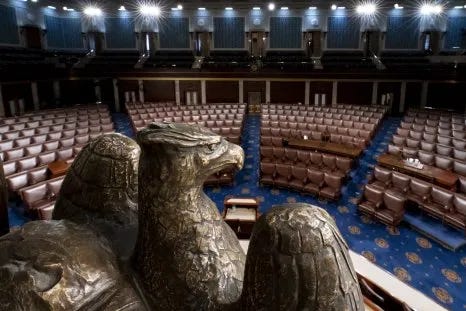Modern Transformation of the Speaker of the House - From Moderator to Ruler
by KrisAnne Hall, JD (excerpts)
KrisAnne Hall addresses the Speaker of the House role straight on, the following are excerpts and overviews of her excellent and informative post, which can be read here…
The Speaker of the House has evolved from a neutral moderator to a powerful partisan leader, reflecting modern political realities but deviating sharply from the intent of the framers of the Constitution. This transformation undermines the principle of equal representation and is a cornerstone of today’s dysfunctional Congress.
The Original Role of the Speaker
When the Constitution was drafted, Congress was designed to distribute power among representatives, ensuring that diverse voices were heard. The Speaker’s role, borrowed from British parliamentary traditions, was initially that of a neutral enforcer of parliamentary procedures. …
The full original role of the Speaker section can be read in KrisAnne’s post…
Centralization of Power
The modern Speaker wields enormous power, controlling the legislative agenda, assigning bills to committees, and dictating floor debates. Thomas Brackett Reed, Joseph Cannon took this role in a different direction that eventually took on the ruins of public liberty through the hands of others.
The full centralization of power section can be read in KrisAnne’s post…
Disproportionate Control of Committees and Legislation
Modern Speakers wield disproportionate influence over committees, dictating assignments and appointing loyalists to key positions to steer legislative outcomes - undermining their independence and diminishing Congress’s role as a truly deliberative body.
The full disproportionate control of committees and legislation section can be read in KrisAnne’s post…
The Framers’ Vision of Local Representation
The framers intended the House to be the legislative body most closely tied to the people, representing the unique concerns of local districts. This principle was designed to balance the Senate’s broader, national vision. However, the modern Speaker’s nationalized agenda shifts the House away from this purpose.
By prioritizing party goals and broad strategies, Speakers often neglect the specific needs of local constituencies. This dynamic undermines the foundational idea of Congress as a forum for regional voices, turning it into a tool for advancing centralized, partisan objectives.
The full framer’s vision of local representation section can be read in KrisAnne’s post…
The Cost of Partisan Leadership
The Speaker’s transformation into a partisan leader has contributed significantly to the dysfunction that now defines Congress. The Speaker’s consolidation of power does not merely silence dissent from opposing parties—it also suppresses differing opinions within their own party. The framers of our Constitution had something else in mind…
The full cost of partisan leadership section can be read in KrisAnne’s post…
Conclusion and Call to Action
KrisAnne’s conclusion can be read in her post…
Congress cannot continue to ignore its duty to represent the American people. The transformation of the Speaker from an impartial arbitrator to a partisan ruler is not just a flaw in governance—it is a betrayal of the Constitution and the citizens it was created to serve. Restoring balance and accountability in this office is not optional; it is essential to the survival of our Constitutional Republic.
all rights belong to KrisAnne Hall, JD



